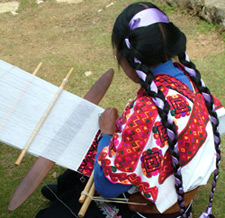Kudos to the the New Mexico-based Grassroots Press, for the enticing title “Weaving Webs of Resistance in Chiapas” on an article by Crystal Massey and Rebecca Wiggins. The article reports on a visit to Chiapas earlier this year by a small group from the Las Cruces-Chiapas Connection (since renamed Weaving for Justice), which helps weaving cooperatives in Chiapas market their products through fair trade.
One of the groups they visited was Tsobol Antzetik (Women United). They describe how these villagers have to carry fresh water (for cooking, washing, drinking) across the village from near the local school. Despite being in one of the wettest regions of the country, they have no easily accessible potable water source.
Some of the women of Tsobol Antzetik belong to Abejas, a Catholic social justice organization founded in 1992, while others are active supporters of the Zapatistas (EZLN). None of the women accepts handouts from the “corrupt” federal government. This means that they refuse any of the possible benefits from Oportunidades, Mexico’s flagship poverty-fighting program, which helps about 60% of all families in Chiapas. The women believe that Oportunidades “hand outs” are a way for the federal government to control the rural population, and prefer to avoid being politically compromised.
The article quotes sociologist Molly Talcott, who describes Oportunidades as “…essentially sterilizing women and attempting to contain women’s resistances [sic] by enlisting them in a small cash assistance program, which in these times, is badly needed.” Critics of Oportunidades claim that its health care workers are asked to meet sterilization quotas.
The marketing of woven items from Chiapas is an alternative way for women such as those in Tsobol Antzetik and their families to boost household incomes. This is where the Las Cruces-Chiapas Connection comes in. They help market the items in the USA and hope their help will offer an alternative to migration in search of employment to rapidly-growing cities such as Cancún or even into the USA.
The article goes on to examine another much publicized development project aimed at improving the situation in Chiapas, the Mesoamerica Project (formerly known as Plan Puebla Panamá). A side effect of this project has been to force some indigenous people off their traditional land to clear the way for major high-budget, capitalist construction projects.
One of the many strategies bandied about as part of the Mesoamerica Project is the forced relocation of rural Chiapas Indians into what the government calls “sustainable rural cities”, a phrase which suggests a less-than-clear grasp of geography! These would enable easier provision of modern services such as education and health care. In turn, they would “free up” potentially productive land that could then be used for agro-industrial plantations (flowers, tropical fruits, specialist timber, coffee). The major downside of such a proposal would be the demise of an ancient subsistence lifestyle, and an end to the food security previously enjoyed by thousands of Maya families.
Opposition to the Mesoamerica Project has already led to unrest and violent reprisals. It is still far from clear what the eventual outcome of the Mesoamerica Project will be.
Related news: Up to now, Oportunidades has focused almost entirely on rural areas. However, the Interamerican Development Bank recently approved a loan of 800 million dollars to extend the program to marginalized families in urban areas.
To learn more about the evolution of PPP and the idea of “rural cities”, see the three-part article by Dr. Japhy Wilson, who lectures in international politics at the University of Manchester in the UK:
- The New Phase of the Plan Puebla Panama in Chiapas, Part One
- Part Two
- Part Three
Mexico’s indigenous groups, social geography and development issues are analyzed in various chapters of Geo-Mexico: the geography and dynamics of modern Mexico. Buy your copy today, and learn more about Mexico’s fascinating geography. Additional knowledge will greatly enhance the pleasures you derive during your next trip to Mexico.

Sorry, the comment form is closed at this time.